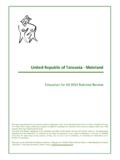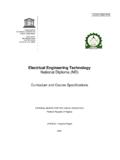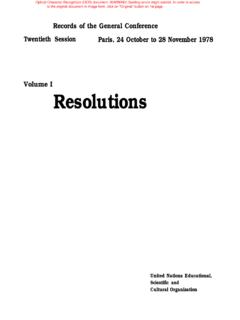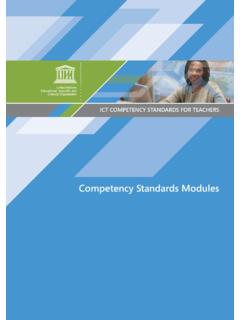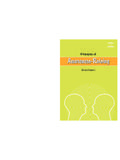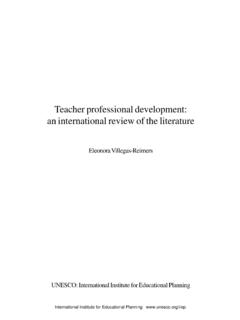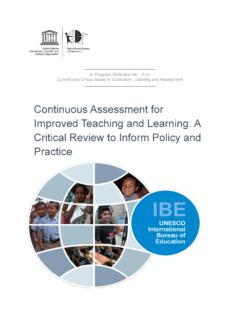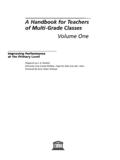Transcription of Changing perspectives on early childhood: theory ... - UNESCO
1 2007/ED/EFA/MRT/PI/33/REV Background paper prepared for the education for All Global Monitoring Report 2007 Strong foundations: early childhood care and education Changing perspectives on early childhood : theory , research and policy Martin Woodhead 2006 This paper was commissioned by the education for All Global Monitoring Report as background information to assist in drafting the 2007 report. It has not been edited by the team. The views and opinions expressed in this paper are those of the author(s) and should not be attributed to the EFA Global Monitoring Report or to UNESCO . The papers can be cited with the following reference: Paper commissioned for the EFA Global Monitoring Report 2007, Strong foundations: early childhood care and education .
2 For further information, please contact Martin Woodhead is Professor of childhood Studies at the Open University, UK. Since his first book, Intervening in Disadvantage: a challenge for nursery education (NFER, 1976), he has published extensively on early childhood , including In Search of the Rainbow, (Bernard van Leer Foundation, 1996) and Cultural Worlds of early childhood (Routledge, 1998). He has carried out policy analysis and research review for Council of Europe, OECD, UNICEF and Save the Children, and has also worked on child labour and children s rights, including several international studies. Recent publications include three co-edited textbooks Understanding childhood , Childhoods in Context and Changing Childhoods, (all published by Wiley, 2003). Martin is co-editor of the journal Children & Society, a member of the editorial board for childhood , and the International Advisory Committee of Journal of early childhood Research.
3 During 2005 he was appointed Special Advisor to the UN Committee on the Rights of the Child, Geneva, in preparation of General Comment 7: Implementing Child Rights in early childhood . 2 CONTENTS I. A DEVELOPMENTAL The formative years of A or a sensitive period?..8 Implications of A time of resilience?..11 II. A POLITICAL AND ECONOMIC Compensating for disadvantage and equalising educational Evaluating long-term outcomes from early early childhood and human Human capital, ethics and III. A SOCIAL AND CULTURAL Developmentally appropriate practices in Diversities in early A social and cultural Constructions and reconstructions of early Quality, critical perspectives and the politics of early IV. A HUMAN RIGHTS A new, universal Implementing child rights in early Participatory rights in theory and Rights and evolving 3 ABSTRACT early childhood policies and practices are shaped by competing images and discourses of the young child.
4 This paper reviews four core perspectives that have been most influential. Put very briefly: 1. A developmental perspective emphasizes regularities in young children s physical and psychosocial growth during early childhood , as well as their dependencies and vulnerabilities during this formative, phase of their lives; 2. A political and economic perspective is informed by developmental principles, translated into social and educational interventions, and underpinned by economic models of human capital. 3. A social and cultural perspective draws attention to respects in which early childhood is a constructed status and to the diversities of ways it is understood and practised, for, with and by young children, with implications for how goals, models and standards are defined, and by whom.
5 4. A human rights perspective reframes conventional approaches to theory , research policy and practice in ways that fully respect young children s dignity, their entitlements and their capacities to contribute to their own development and to the development of services. For each of these overarching perspectives , the paper outlines a cluster of specific theoretical, research and policy themes, summarizes major areas of controversy, and identifies a range of alternative visions for early childhood . INTRODUCTION Enhancing the quality of young children s lives is now a national and international priority, expressed through research and policy initiatives, programme development and advocacy. Improving early childhood education and care is a major theme. Participants at the World Conference on education for All in Jomtien, Thailand, in 1990, pledged to provide primary education for all children and massively reduce adult illiteracy by the end of the decade.
6 This was followed up in 2000 with the Dakar Framework for Action on education for All. Goal 1 is Expanding and improving comprehensive early childhood care and education , especially for the most vulnerable and disadvantaged children. Contributing to a review of the implications of Goal 1 is the immediate stimulus for this paper, but responses to Goal 1 need to be set in context of other international early childhood initiatives from UNICEF, The World Bank etc, and from numerous other regional and national agencies, and non governmental organisations and foundations. Moreover, early childhood policy developments are increasingly informed by the UN Convention on the Rights of the Child 1989, and by the work of the Committee on the Rights of the Child, with responsibility for monitoring States parties progress in meeting obligations agreed to under the Convention.
7 In 2004, the UN Committee set aside a day of general discussion on early childhood , and this has been followed up by preparation of General Comment 7 on Implementing Child Rights in early childhood , formally adopted at the Committee s session in September 2005 (UN Committee on the Rights of the Child, 2005). This paper does not focus on policy developments per se, but on underpinning knowledge and beliefs about young children s development and their role in families, communities and society. It is especially concerned with the theories and research 4traditions that inform early childhood policy development and practices. My aim is to provide a brief survey of some major landmarks in a complex and rapidly Changing field. What follows is inevitably selective. No topic is comprehensively reviewed, but I have indicated some major sources in each case.
8 Other commentators from a different region of the world, or with a different disciplinary background, or with a different research biography would no doubt tell a different story, and indeed many of the books and articles referred to throughout the paper offer these alternative accounts. Philosophical and scientific interest in early childhood has a very long history, and relevant contributions span the full range of academic disciplines, (including biology, psychology, sociology, anthropology, economics) as well as major areas of applied research (notably, education , social policy, health research, law, development studies). The field can appear quite fragmented, with competing theoretical frameworks linked to profound differences in scientific and epistemological perspective , and in some cases these are closely aligned with particular policy objectives and narratives ( early intervention and school outcomes; working parents and child care services etc) and approaches to curriculum and pedagogy ( child-centred developmental models; community based ecological models).
9 Another significant feature of the field is that dominant paradigms (and the range of competing paradigms) have been largely associated with recent history of economic, educational and social changes in a minority of economically rich, Western societies. Critique of these dominant paradigms has in itself been the stimulus for much innovative theoretical study (as later sections will explain). Ironically perhaps, these critiques have for the most part also originated amongst Western scholars, and in some cases continue to privilege early childhood settings and aspirations for young children only available to a tiny minority of children and families. Recent emergence of a much stronger rights based approach to policy development draws attention to global injustices in early childhood , including millions of young children daily denied their most fundamental entitlements to survival, health and well-being.
10 This is matched by growing interest amongst scholars in the prospects for a more interdisciplinary, international childhood Studies, along with other small steps towards achieving more globally balanced capacities for research, innovation and evaluation. Finally, the relationships between research and policy are rarely linear - of research informing policy, or vice versa. Research and policy more often appear to function as parallel and sometimes interconnected communities of interest, sometimes shaping and sometimes feeding on the other, and other times in dispute about implications of research or justifications for policy. Meanwhile, both shape and are shaped by the broader political/economic/cultural context of early childhood work, nationally and regionally, and accommodate (to greater or lesser degree) to global economic, political, demographic, technological and cultural change.
